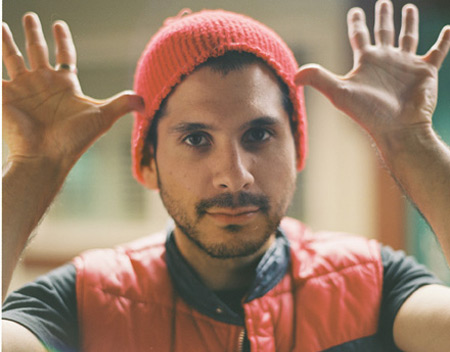
I like to hear songwriters like John Darnielle, David Berman, and Yoni Wolf because they fulfill me in a way that poetry use to. Many people would balk at this juxtaposition — Wolf certainly does when I mention it to him — but there remains within me a desire for confessions told with smart and vivid words. Charles Bukowski spearheaded the idea that poetry should access the most jaded and unaffected among us, and I have searched for that same easy kind of verse since I discovered Love Is A Dog From Hell at the age of 14. That is why I am excited to enjoy a conversation with WHY?'s frontman, the aforementioned Yoni Wolf, who affords me visions into a universe where you can hang your apostrophe on your question mark without having sinned against grammar.
WHY? is the type of band that you listen to if you like hip-hop that isn't violent, daydreams that aren't sentimental, and those who seek the truth without actually expecting to find it. Their 2008 album Alopecia is good, really good. My almost two-hour interview with Wolf is painful; I am horribly shy when I'm not typing, and he's done too many of these things for mine to be nearly as revelatory as his music. What does come out of the interview, which my minidisc ate half of, is the fact that WHY? is honest enough to really offend some people. This could be the source of their relevance.
When I ask Wolf whether his work has in fact offended people, he mentions Relevant Magazine, a Chicago-based glossy that does for Christianity what High Times does for pot, except of course with less pictures of girls clothed only in drugs. Music editor Dylan Peterson interviewed Wolf when they toured Chicago this year and didn't mention that it was for a Christian magazine. He interestingly doesn't include any of that interview in his article about WHY?, instead musing on his own fascination with the spiritually lost artist.
“After hearing this lyric, I almost feel the need to pray for the singer. But then, he gloats at my intention by proving to be one step ahead of me. The very next lyric: ‘I can sense somewhere right now I'm being prayed for.' And I stutter, decide not to pray, and continue listening to this insolent hipster.”
Peterson postulates that “perhaps art is his savior,” and I don't think that it is. This is because when I ask him whether he is afraid that he will one day run out of material, he says that he'll just find something else to do — he mentions a wife, children, a permaculture farm. And as for God or a savior, Wolf tells me with deadpan clarity that he is not religious. It is this turning away from the hope that chaos will one day subside that gives WHY? its blasphemous edge, which rejects not only religious order, but secular order as well.
Wolf rarely gives a straight answer. Most of my questions tear open a series of suggestions that second-guess and contradict one another. On politics, he says,
It is what it is. To sustain what we've created here, it's necessary to maintain an order. You know, to have a government, to have policies and rules, because there's so many people that I guess if you didn't have that, maybe there would be chaos. Not that chaos is bad — maybe that's okay — yeah, maybe that's fine. Maybe it's just survival of the fittest and who's got the biggest gun or something like that. I'm not knocking that. I think about how complicated the system is that we live in and how detached from the natural world we are and how dangerous that is and how eventually it's going to destroy itself. I'm not an alarmist, and I really have no idea what's going to happen in the future, but it seems obvious to me that we've sort of taken things to a point past where it's been able to sustain itself — the planet, you know.
This is the kind of thinking that makes people go crazy at Burning Man. Nobody wants to talk about the rubbing together of panic and overpopulation. As religious schisms alienate Mormons from queers and perpetuate Middle Eastern bloodshed, musicians are able to take up the voice of the poet, the prophet and the fool to cut through to the most cynical possibility, which is often also the most likely. “The Hollows” brings this gem:
From behind bars it's not
so hard to see he's risen,
But nobody finds God
and then goes to prison.
Perhaps more radical than this suspicion that imprisonment spawns belief and not vise versa is the way that Wolf calls himself out at the end of the song:
In a crowded room, project a
debonair aloof impermanence.
Be shrouded loosely in a
heavy air of indeterminates.
WHY?'s music may not be poetry, but it does deliver confessions with both smartness and vision. That which empowers these confessions could be the chaos that lies just beyond them — the chasm into which Wolf seems to scream, and also laugh. When I bring up Phillip Levine, a poet who is also preoccupied with death, he says, “Who in their right mind isn't? It's the only conclusion.”